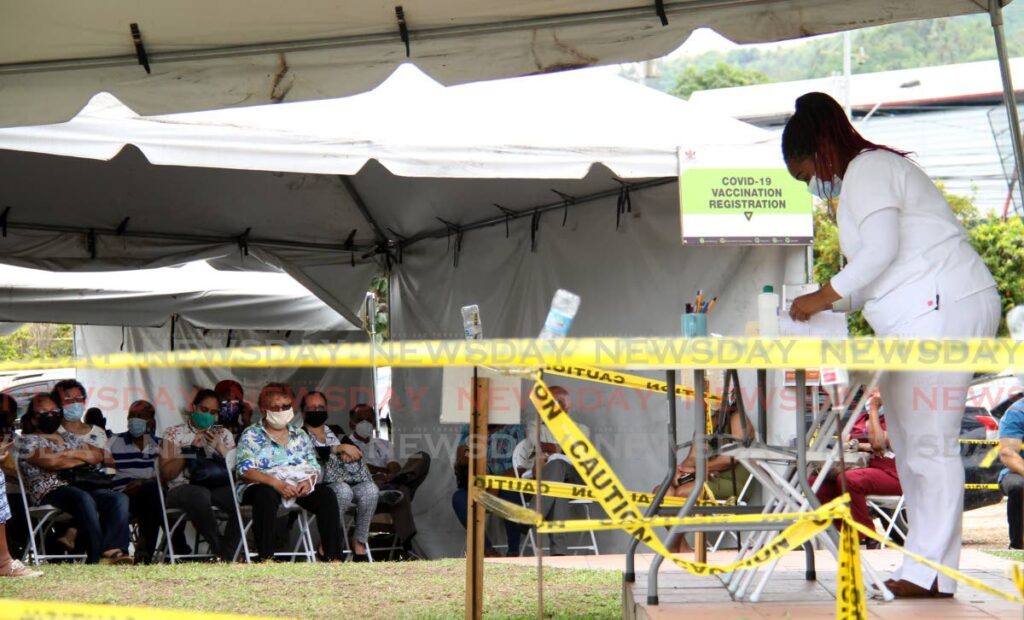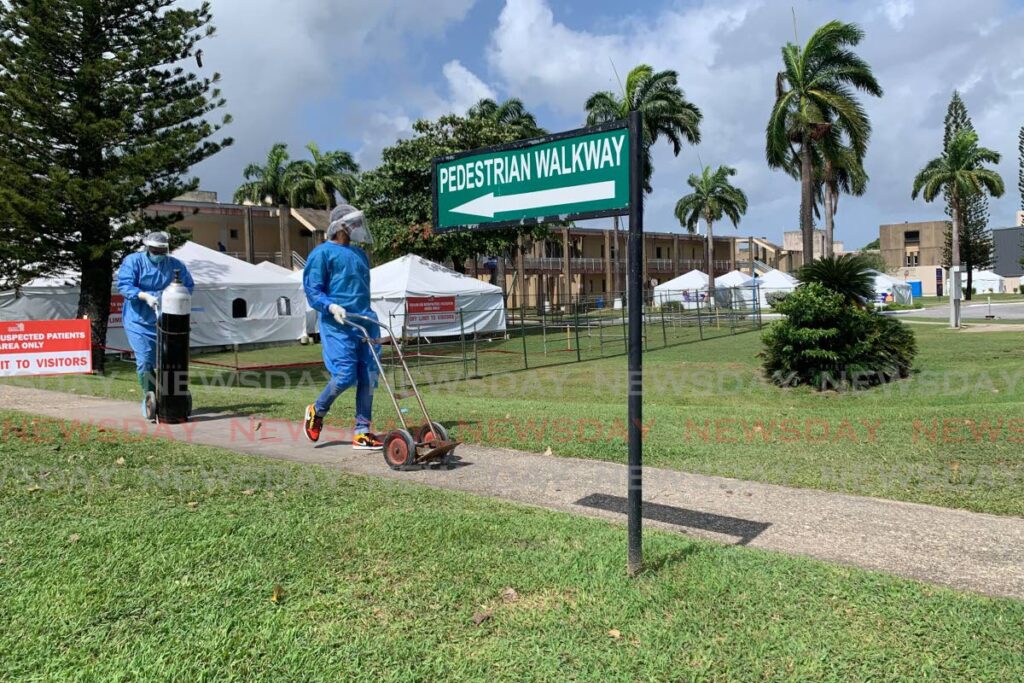Covid19 committee reports: Better care for medical staff means better care for patients

The staff at the parallel health care system needs to be cared for, and given access to supplies and equipment in order to better care for covid19 patients.
That seemed to be the one of the main points of the report from the committee appointed to investigate the factors contributing to clinical outcomes of covid19 patients in TT which was laid in Parliament on Friday.
The report gave 16 physical and intangible recommendations to improve conditions of staff and patients in the parallel health care system, mostly to assist the staff in caring for patients more efficiently and effectively.
Some of the shortfalls in the system included staff shortages at every level from executive management to doctors and nurses to orderlies and patient escorts. It said there were difficulties with turning the patient to lie on their abdomen because of shortages of attendants and orderlies.
It added that at some sites, young doctors had to sleep on mattresses on the floor. Whether male or female, three or four doctors had to share the same sleeping accommodation and some room doors could not be locked. And locum doctors complained of one- to three-month contracts that created uncertainty and affected their moral as they risk their lives.
“Almost every single doctor we met complained of overwork almost to the point of exhaustion. Some of these doctors also had to do non-medical jobs eg, lift and move patients, pull up patients in bed, process nasal swabs.”
The report said under normal circumstances, the nurse to patient ratio would be one nurse to one or two patients in an intensive care unit (ICU), and one nurse to four to six patients on the ward.
However, the committee was told that often there was often one ICU nurse to six ICU ventilated patients, and one nurse to 20-30 patients on the wards, negatively affecting the nurses mentally, physically and psychologically. And, that is in addition to the psychological pressure and stress dealing with many deaths per day, including when one of their colleagues died from covid19.
There were reports of shortages of tocilizumab, midazolam, propofol and methylprednisolone, and dexamethasone was often substituted for methylprednisolone, as well as difficulties in getting tracheostomies done to make it easier for patients to breathe.
Also, in Tobago, the parallel health care system was not as sharply defined as in Trinidad, so there was no structured parallel health care system there.
What should be done
The list of recommendations include a specific feedback system to monitor the needs of frontline workers, as some felt abandoned by the leadership, onsite recreational facilities for all RHAs, 24-hour access to the C40 central stores, and a review of the policy regarding Tocilizumab use.
“Tocilizumab is given at an advanced stage of covid19. Most staff were very impressed by its effects and perhaps C40 needs to increase purchasing of this drug. Though it is an expensive drug there is a cost-benefit to be realized from its use.”
It suggested the urgent implementation of an electronic data management and verification system with links to ambulance transfer database, community care and hospital care databases.
It recommended the use of specific patient care assistants to help with feeding and distribution of meals and that meals be provided for staff who work in isolated areas. Also, mental health support should be provided for staff including an onsite staff psychology service and job security.

“Short locum and lack of job security took a mental health toll on young doctors and young nurses. We recommend that such staff should be given contracts for a minimum of one year.”
It said a national policy on ICU admissions and care of the elderly should be made as 15.2 per cent of paediatric admissions were to ICU compared with 1.2 per cent of people over 80 years old.
“This was remarkable given the high death rates amongst the elderly. It was also noted that there were special paediatric ICU beds whereas there were no such facility for the elderly. In addition, the demand for paediatric ICU beds was in absolute terms much smaller than that for adult ICU beds. We did not find any mention of a national policy regarding admissions to ICU for persons of different ages, and recommend that such a policy needs to be articulated.”
It also recommended more should be done to help prevent and manage non-communicable diseases, which are the main contributors to severe illness and death in patients with covid19. That messaging should be aimed at children, adolescents and young adults to ensure citizens become and remain healthy.
The 105-page report also stressed that the four weeks given to report was “far too brief” for a thorough assessment so a rapid assessment was presented. And it outlined the arrival of covid19 in the country, variants, spikes, the arrival of vaccines, a run down of the various facilities in the parallel health care system, outlined the committee’s process and schedule, and listed the challenges and roadblocks to a more comprehensive report.
Lack of data was a challenge
Challenges included the lack of data collected by hospital staff, almost no data from Tobago, limited time of the staff to retrieve the data requested and technical issues.
For example, under the heading Covid19 Patients in Hospital, it said, “The variables requested and received included institution, date of admission, age, sex, level of care, vaccination status and comorbidities. However, the latter was entered using an open text format with inconsistent spacing delimiters and spelling that could not be easily coded for analysis, especially given the Committee’s tight deadline.
“The comorbidity data were therefore excluded from analysis. In addition, the spreadsheet only included hospital admission data so, the outcome of the patients (alive or dead) and the duration of stay were not available.”
However, it said the management protocols were consistent within World Health Organization guidelines and international best practice. And there were adequate supplies of personal protective equipment, oxygen, and good foresight and plans regarding ordering and stocking of most drugs.
“We were not able to detect any delays in the provision of care which might have led to a negative result except that they presented in the second phase of the disease.”
It also clarified some questions as to what was considered a covid19 death in TT. In December, Chief Medical Officer Dr Roshan Parasram said anyone who had covid19 at the time of death was classed as “dying with covid.” Then there were those who were suffering from covid19 and actually died from covid19.
The report said, “Covid19 deaths are therefore those occurring where confirmed SARS-CoV-2 infection was determined to be either the direct cause or a contributory cause of an individual’s demise. This definition is entirely consistent with the epidemiological definition used by the World Health Organization.”
Conclusions from data analysis reported high rates of comorbidity among patients who died, especially hypertension and diabetes; and fully vaccinated people were less likely to be admitted to the high dependency unit (HDU) or ICU (5.4 per cent) compared with those who were not (7.9 per cent).
The covid19 committee
Prof Terence Seemungal (chair)
Dr Anton Cumberbatch
Dr Vidya Dean
Prof Phyllis Pitt Miller
Prof Donald Simeon

Comments
"Covid19 committee reports: Better care for medical staff means better care for patients"